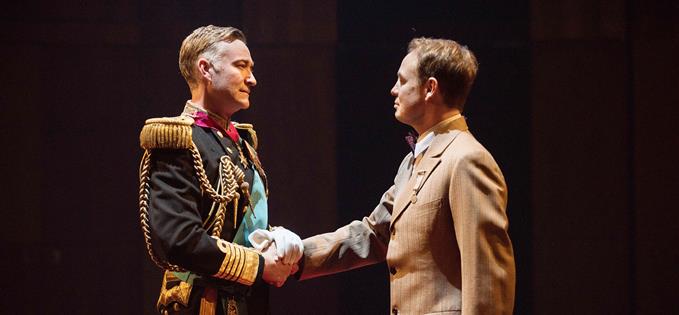WHEN Prince Albert, son of George V, makes a speech at the closing of the 1925 Commonwealth exhibition, it’s a personal and briefly public humiliation; his persistent stammer ensuring the whole exercise is an embarrassing endurance for listeners as well as the speaker. Thankfully, he’s the second son, and so will be spared too many such occasions.
Writer David Seidler himself struggled with a stammer: his motivation for writing the play.
As we know, older brother David, later Edward VIII, abdicated in order to marry twice-divorced Wallis Simpson, leaving the throne to Prince Albert, who later became George VI, father to Elizabeth II and king during WWII. Good speeches, in an age where a radio in every home helped unite the nation, were vital.
Manchester Opera House is currently hosting Chichester Festival Theatre’s much praised stage version of the story in The King’s Speech, the film version of which won four Oscars in 2011. The King’s Speech places the story neatly between the embarrassment of the 1925 speech and the near-faultless delivery of the world-broadcast speech given in 1939 on the declaration of war with Germany. Along the way it provides an amusing glimpse at some of the restrictions of the British class system, a clear explanation of the term ‘morganatic marriage’ and works on themes of confidence, relaxations and individual spirit, overshadowed by a strong belief that the country was heading for war.

It’s a story of success in the face of failure. Lionel Logue, working as an unqualified speech therapist after a successful career as a vocal coach and an unsuccessful career as an actor, is credited with the success, once the barriers of class and expectation were sufficiently punctured to allow a genuine collaborative relationship between royalty and the common man.
Jason Donovan returns to Manchester Opera House with a warm, entertaining portrayal of Antipodean Logue, a colonial with a sufficiently cynical attitude towards the superior rights of royalty and a strong enough belief in the superiority of his own methods to make the necessary breakthrough, allowing ‘Bertie’, as the king’s friends are allowed to call him, to work with relaxation techniques and improve his performance. Raymond Coulthard as King George VI gives a convincing portrait of a man bound by convention who learns to let go, just a little, just enough.
In a strong cast Claire Lams echoes the tones and grace of Queen Elizabeth, known more recently as The Queen Mother, while Katy Stephens shines as Logue’s wife, Myrtle.
Writer David Seidler himself struggled with a stammer: his motivation for writing the play. He agreed to The Queen Mother’s request not to complete the play during her lifetime.
Director Roxanna Silbert, whose work was previously seen in Comedy of Errors at The Royal Exchange has taken on the challenge of engaging an audience who have already seen a fine version of this story on the big screen. She largely succeeds. There’s some cute business with morning preparations - royalty, it seems, can barely dress themselves – and the class barriers are given a strong and amusing highlight. Direction gives space to two fine actors to breathe and allow the growing, but always slightly constrained, friendship between the two men to take centre stage, breaking through the fear and experience of failure to produce a great result.
Touring productions in Manchester Opera House can feel a little small in such a large space. At times this production does too, despite its Chichester home holding a large audience, and some lines are inaudible. However the central performances and witty direction pull this through.
The King’s Speech is at Manchester Opera House until Saturday 4 April














